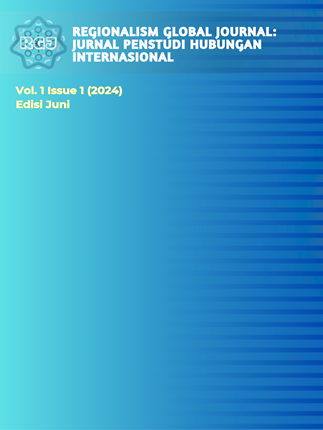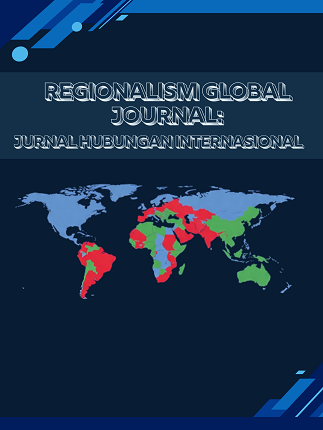ALASAN PEMBERLAKUAN UNDANG-UNDANG ANTI HOMOSEKSUALITAS OLEH PEMERINTAH UGANDA TAHUN 2023
DOI:
https://doi.org/10.30872/RGJ.v27i1/3550Keywords:
Uganda, sistem politik, Hukum Anti-Homoseksualitas, Perumusan kebijakanAbstract
Penelitian ini bertujuan menganalisis alasan di balik diterapkannya Undang-Undang Anti-Homoseksualitas oleh pemerintah Uganda pada tahun 2023. Undang-undang ini menjadikan hubungan sesama jenis sebagai tindak pidana dengan sanksi berat, memicu kontroversi baik di dalam negeri maupun secara internasional. Di satu sisi, kebijakan ini dianggap sebagai simbol perlindungan terhadap identitas budaya dan kedaulatan nasional, serta bentuk penolakan terhadap intervensi asing. Di sisi lain, Uganda menghadapi tekanan dari donor internasional yang menekankan pentingnya perlindungan hak asasi manusia, termasuk bagi kelompok LGBTQ+. Penelitian ini menggunakan metode eksplanatif dengan data primer dan sekunder, serta pendekatan Teori Sistem Politik David Easton. Hasil penelitian menunjukkan bahwa undang-undang ini tidak hanya mencerminkan pandangan budaya konservatif, tetapi juga merupakan strategi populis untuk memperoleh dukungan politik domestik. Pemerintah Uganda memanfaatkan isu homoseksualitas sebagai alat politik untuk merespons tuntutan internal dan menjaga stabilitas kekuasaan. Kebijakan ini lahir dari dinamika sosial-politik kompleks, termasuk pengaruh agama, tekanan internasional, serta kebutuhan untuk mempertahankan legitimasi pemerintah. Temuan ini memberikan wawasan tentang bagaimana kebijakan kontroversial terbentuk dalam konteks politik domestik dan global, serta dampaknya terhadap masyarakat Uganda secara luas.
References
Ammah, D. M., & Marwanto. (2019). Perlindungan Internasional Terhadap Hak Asasi Manusia Orang-Orang LGBT Dengan Bantuan PBB. Kertha Negara: Journal Ilmu Hukum, 7(7), 1- 16.
Athumani, H. (2023, Agustus 9). World Bank Says No Future Funding for Uganda Due to Anti- Gay Law. Retrieved from VOA News: https://www.voanews.com/a/world-bank-says- no-future-funding-for-uganda-due-to-anti-gay-law/7218330.html
Atuhaire, P. (2023, Maret 23). Uganda Anti-Homosexuality bill: Life in prison for saying you're gay. Retrieved from BBC News: https://www.bbc.com/news/world-africa-65034343
Bomponi, B., & Valois, C. (2017). Sexualizing politics: The anti-homosexuality bill, party-politics and the new political dispensation in Uganda. Critical African Studies, 9(1), 52-70, diakses melalui https://www.tandfonline.com/doi/abs/10.1080/21681392.2015.1137479.
Boyd, L. (2013). The Problem with Freedom: Homosexuality and Human Rights in Uganda. Anthropological Quarterly 86(3), 697-724. https://dx.doi.org/10.1353/anq.2013.0034.
Dasandi, N. (2022). Foreign aid donors, domestic actors, and human rights violations: the politics and diplomacy of opposing Uganda's Anti-Homosexuality Act. JournalJournal of International Relations and Development, 25(3), 657-684, diakses melalui https://research.birmingham.ac.uk/en/publications/foreign-aid-donors-domestic- actors-and-human-rights-violations-th.
Hagopian, A. e. (2017, Juni 5). Anti-homosexual legislation and HIV-related stigma in African nations: what has been the role of PEPFAR? Retrieved from National Library of Medicine: diakses melalui https://www.ncbi.nlm.nih.gov/pmc/articles/PMC5496073/
Healy, L., & Kamya, H. (2014). Ethics and International Discourse in Social Work: The Case of Uganda's Anti-Homosexuality Legislation. Ethics and Social Welfare, 8(2), 151-169, DOI: 10.1080/17496535.2014.895400.
Hellmeier, S. (2021). How foreign pressure affects mass mobilization in favor of authoritarian regimes. European Journal of International Relations Vol. 27(2), 450–477.
Kisika, S. (2024, Oktober 16). Report: Uganda’s Anti-Homosexuality Act has cost country $1.6 billion. Retrieved from Washington Blade: https://www.washingtonblade.com/2024/10/16/report-ugandas-anti-homosexuality- act-has-cost-country-1-6-billion/
Moore, E. V. (2021). Debating Sex and Sovereignty: Uganda’s New National Sexuality Education Policy. Sexuality Research and Social Policy, diakses melalui https://doi.org/10.1007/s13178-021-00584-9.
O'Mahoney, J. (2015). Why did they do that?: the methodology of reasons for action. International Theory, 7(2),, 231-262.
Park, H. (2024, Juli 22). The colonial legacy of homophobia in modern-day Uganda. Retrieved from International Institute for Democracy and Electoral Assistance (International IDEA): https://www.idea.int/blog/colonial-legacy-homophobia-modern-day-uganda
Pribadi, T. M. (2014). Pendekatan Dalam Analisis Sistem Politik. Kementerian Riset, Teknologi, dan Pendidikan Tinggi.
Rudman, A. (2015). The protection against discrimination based on sexual orientation under the African human rights system. African Human Rights Law Journal 15(1), 1-27, diakses melalui https://www.researchgate.net/publication/283164929_The_protection_against_discri mination_based_on_sexual_orientation_under_the_African_human_rights_system.
Strand, C. (2024). Understanding Chilling Effects in Digital Spaces–A Study of Ugandan LGBT+ Advocacy in the Wake of the Draconian 2023 Anti-homosexuality Act. In International Conference on Implications of Information and Digital Technologies for Development (pp. 167-180). Springer Nature Switzerland.
Sylvia Garcia, R. (2023, Juni 1). Retrieved from Twitter: https://x.com/RepSylviaGarcia/status/1664005626458959878
Downloads
Published
Issue
Section
License
Copyright (c) 2024 Dwi Resita, Yayuk Anggraini

This work is licensed under a Creative Commons Attribution-ShareAlike 4.0 International License.




